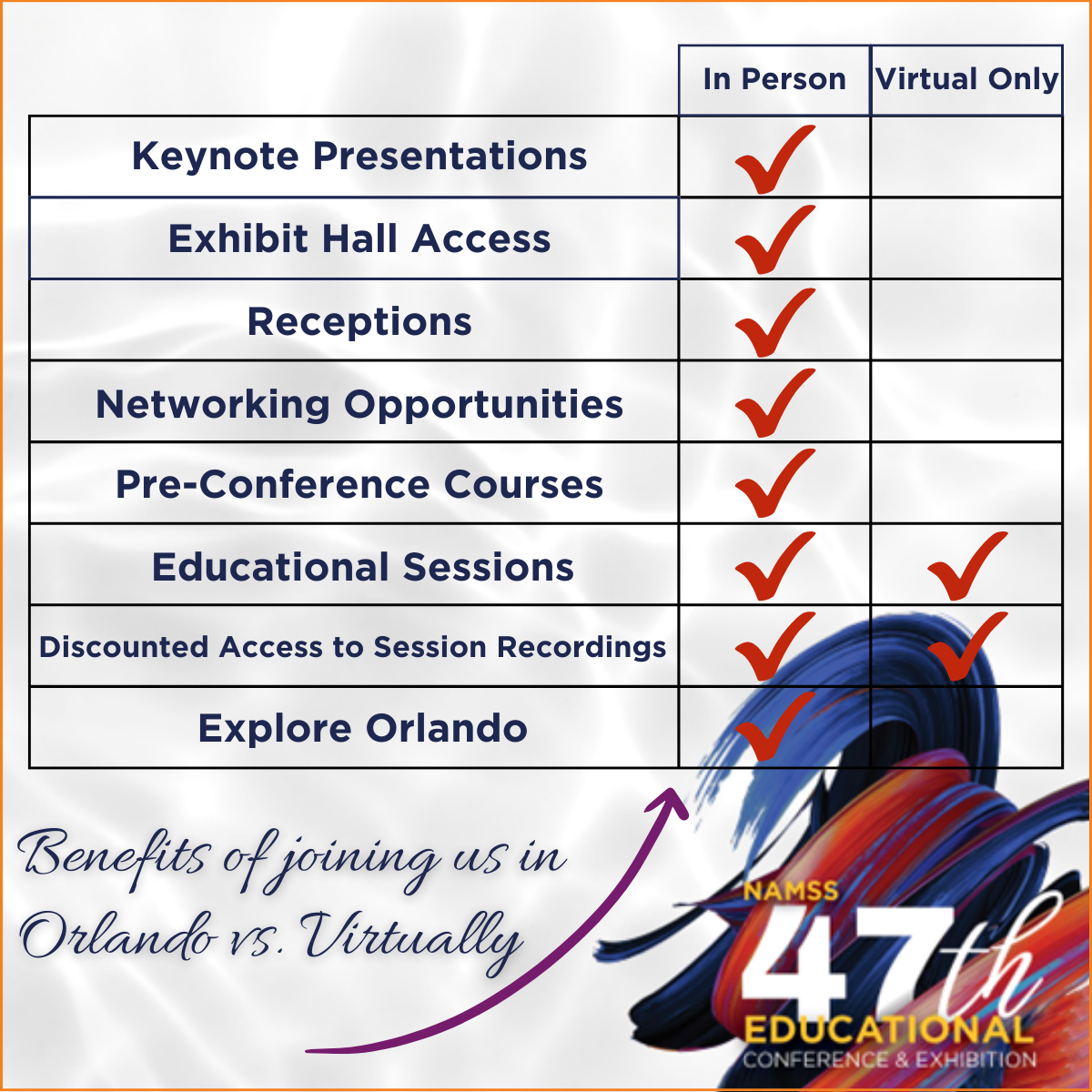Earn up to 14 NAMSS CE credits by attending virtually!
This year, NAMSS will offer a limited virtual component to help MSPs meet their educational needs. Virtual only attendees will have access to our virtual conference platform to tune in to one session per time slot and learn from some of the best instructors and thought leaders in the profession - all while earning up to 14 NAMSS CE credits. Can't attend a session as it's being live-streamed? Virtual sessions will be recorded and available to virtual attendees to view on-demand.
Explore the sessions being offered virtually below. For full session details and descriptions, view the full virtual program. Virtual sessions are indicated on the program website with a laptop icon.
View the Virtual Program
Virtual Attendee How to Guide
 Monday, September 11
Monday, September 11
Can You Hear Me Now? How to Speak So that Administration Will Listen--Speaking the Language of Leadership
10:15 a.m. – 11:15 a.m. ET
Presented by: Julie Hatley and Debbie Kesselring
Leadership/Professional Development Track
Made to Measure - Informal Remediation, Corrective Action, and Fair Hearings
11:30 a.m. – 12:30 p.m. ET
Presented by: Avery Schumacher and Jeremy Morris
Credentialing/Privileging Track
The Role of the MSP in an HRO
1:45 p.m. – 2:45 p.m. ET
Presented by: Maggie Palmer
Operational Management Track
A Payer Enrollment Case Study: From Outsourced to In-House
3:00 p.m. – 4:00 p.m. ET
Presented by: Yesenia Servin and Heidi Martinez
Provider Enrollment Track
Case Study: Using a Physician Coach Within the Medical Staff to Address Professionalism Issues|
4:15 p.m. – 5:15 p.m. ET
Presented by: Amy Lyons; Lewis Low; Ellen Singer, MD
Operational Management and Quality/Peer Review Tracks
Tuesday, September 12
Verify and Comply: CMS, TJC, NCQA, ACHC, and DNV Credentialing Standards Compared and Contrasted
8:00 a.m. – 9:00 a.m. ET
Presented by: Frances Ponsioen, CPMSM, CPCS and Stephanie Russell, BS, CPMSM, CPCS
Accreditation/Regulatory Track
Be Careful What You Wish For. Are You Ready to Navigate the Potentially Troubled Waters of a 3-Year Reappointment Cycle?
9:15 a.m. – 10:15 a.m. ET
Presented by: Sally Pelletier, CPMSM, CPCS and Mary Hoppa, MD, MBA
Credentialing/Privileging Track
Are You Ready for Integration? Spreadsheets, Databases, Oh My!!!
11:15 a.m. – 12:15 a.m. ET
Presented by: Cheryl Cisneros
Provider Enrollment and Healthcare Systems Tracks
Impactful Conversations: The Talks That Save Careers, A Fireside Chat
1:30 p.m. – 2:30 p.m. ET
Presented by: Sara Cameron; Delicia Dimberg; Donald Lefkowits; Mark Smith
Quality/Peer Review Track
Get Comfortable with Being Uncomfortable: The Importance of Discomfort and Professional Growth
3:15 p.m. – 4:15 p.m. ET
Presented by: Louise Canlas, BA, CPCS, CPMSM
Leadership/Professional Development Track
SHOWWW ME THE REVENUE! How AI is Improving Our World!
4:30 p.m. – 5:30 p.m. ET
Presented by: Joseph Travagline
CVO Track
Wednesday, September 13
Commercial CVO’s: Friend, Foe or Both?
7:30 a.m. – 8:30 a.m. ET
Presented by: Mark Hirschhorn, CPCS & Jamie Kates, MHA, CPCS
CVO Track
Tying It Together: Quality, Patient Safety & Peer Review
8:45 a.m. – 9:45 a.m. ET
Presented by: Karen Reed-Coffman & Tiffany Lambeth
Quality/Peer Review and Healthcare Systems Tracks
Legal Year in Review: Best and Better Practices for MSPs
10:00 a.m. – 11:00 a.m. ET
Presented by: Michael Callahan, JD
Accreditation/Regulatory Track
